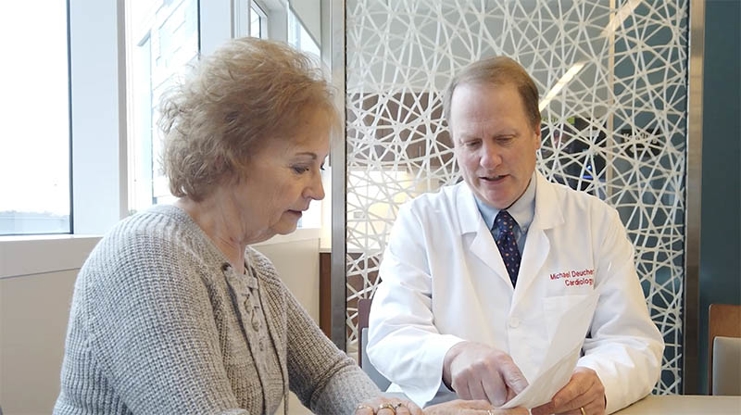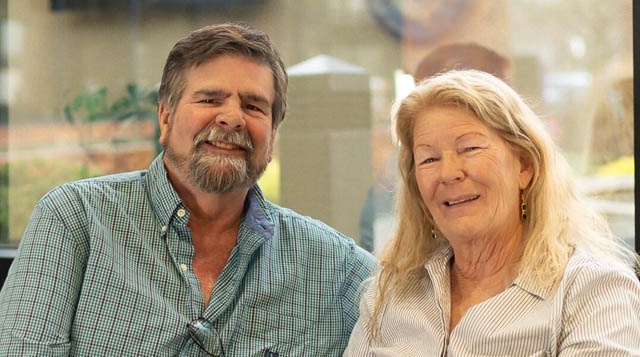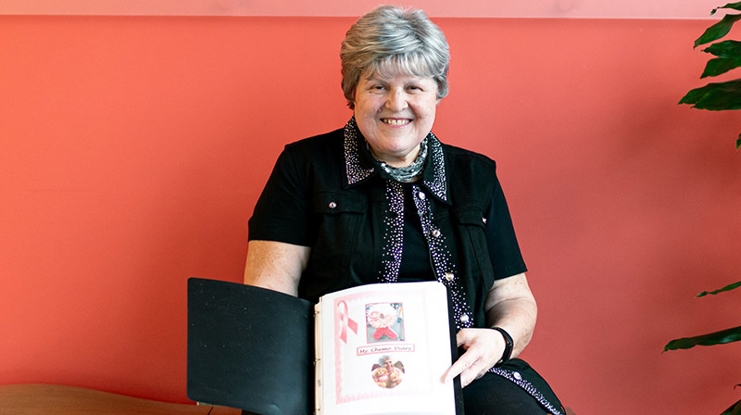From Open-Heart Surgery to Climbing Mount Sinai: Betty’s Story
- Category: Heart & Vascular

“ Dr. Deucher supported me when I was my own advocate.”
With a strong family history of heart disease, Betty Giguere, 62, of Middleburg Heights, has always made her health a priority. She eats well, exercises and maintains a healthy weight. So, when she saw Michael Deucher, MD, a board-certified cardiologist on Southwest General’s Medical Staff, in the fall of 2023, Betty had no reason to believe it would be anything other than a routine appointment.
Betty’s visit went well. She’d been seeing Dr. Deucher annually for nearly 20 years after experiencing a minor heart episode. Health-wise, Betty was in a good place, and a physical exam provided no cause to worry. But as she was about to say goodbye to Dr. Deucher, Betty felt an instinct to ask a few additional questions.
“Something told me to sit back down and ask him how things were flowing around my heart,” Betty recalls, adding that her family history of coronary artery disease was on her mind.
When Zero is Hero
Coronary artery disease is a common heart condition, caused by a buildup of plaque in the heart’s arteries. Plaque collects slowly over time, long before there are any symptoms of disease.
Dr. Deucher took Betty’s concerns seriously, and he suggested a test called coronary artery calcium scoring. This painless, non-invasive test uses a computed tomography (CT) scan to obtain a 360-degree view of the heart, including the coronary arteries that supply blood and oxygen to the heart. These detailed images show the amount of calcium in the coronary arteries.
What does calcium have to do with coronary artery disease? While coronary plaque (fats and other hardened substances) is not detectable on a CT scan, calcium, a mineral often present in the plaque,) is detectable. The amount of calcium detected is scored on a scale of 0–1,000. The ideal calcium score is zero, as the higher the score, the more plaque is present and the greater the risk of narrowed or blocked coronary arteries.
Coronary artery calcium scoring can, therefore, help diagnose early coronary artery disease, identify patients at risk and help guide preventive measures such as lifestyle changes or medications.
A Surprise Finding
Recalling her conversation with Dr. Deucher about the coronary artery calcium scoring, Betty said they were both fairly confident it would return a very low score. To everyone’s surprise, the number came back much higher than Betty and her doctor anticipated: in the 500s.
To further assess Betty’s risk, Dr. Deucher ordered a treadmill stress test. A stress test evaluates how the heart functions under physical exertion by monitoring heart rate, blood pressure and electrical activity while the patient walks or runs on a treadmill. Betty didn’t pass the stress test, so she then needed a heart catheterization. In this procedure, a thin, flexible tube is inserted into a blood vessel and guided to the heart to assess the severity of cardiovascular conditions by taking images and measuring pressures inside the heart and its arteries.
After Betty’s heart catheterization, she learned that the primary artery to her heart was 95 percent blocked. To restore blood flow to her heart, she needed open-heart surgery, which took place the very next day.
Rehab for a Dream Vacation
Betty’s open-heart surgery was followed by extensive cardiac rehabilitation—32 sessions—at Southwest General. During this time, the Cardiac Rehabilitation staff were determined to help Betty reach an important personal goal: to hike through Egypt on a bucket-list trip with her husband. In February 2024, Betty achieved this goal, and she was even able to hike up Mount Sinai–three hours uphill and three hours back down. “The whole team in Cardiac Rehab was phenomenal,” Betty says.
Betty also is grateful to her cardiologist, who listened to and acted on Betty’s instincts. “Dr. Deucher supported me when I was my own advocate,” she recalls, “He easily could have said ‘You're okay; you have no symptoms; I'll see you back in a year.’” Instead, she says he stood behind her desire to dig deeper.
Should You Ask About Your Cardiac Calcium Score?
Dr. Deucher is an advocate for cardiac calcium scoring. “Coronary artery disease, heart disease, is the number one killer of men and women in the country as well as the world, so it is a very important test that we have in our armamentarium,” he says. “It's the best non-invasive test to assess people thought to have blockages in their arteries.”
Dr. Deucher explains that other, more extensive and expensive tests are not always appropriate or covered by insurance for patients with only intermediate risk. He describes the typical calcium score patient as someone with a family history of heart disease, a smoker or someone with high blood pressure, diabetes or other conditions that put them at risk. The test results give him an idea of whether the patient has any plaque—and if so, how much—at that moment in time. Most importantly, the information is actionable. It can indicate the need for further testing, as in Betty’s case, or other adjustments like lifestyle modification or medications.
Betty encourages other at-risk patients to ask their own doctors about the test. “Please don't hesitate. It saved my life,” Betty says. She also encourages others to turn to Southwest General for their cardiac care. “Everybody is so helpful,” she says, “from the nurses and the staff who saw me through my recovery after the open-heart surgery … everybody was right there asking me, ’What do you need? What can we do for you? How can we help you?’ It was a wonderful experience.”
About Coronary Artery Calcium Scoring at Southwest General
Southwest General offers coronary artery calcium scoring at its Main Campus at no cost for patients. Patients do need an order for the test from their provider, but it can be from a primary care provider and not necessarily from a cardiologist. The test takes just a few minutes; there are no injections or fasting requirements, and patients can return to normal activities immediately after testing is completed. Learn more about the test here.



